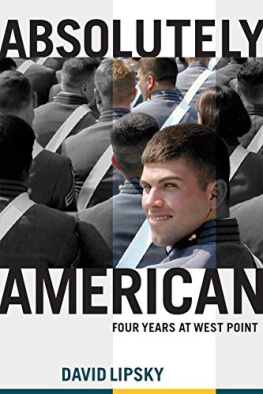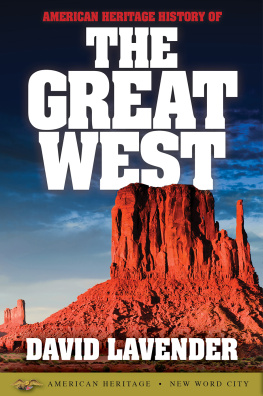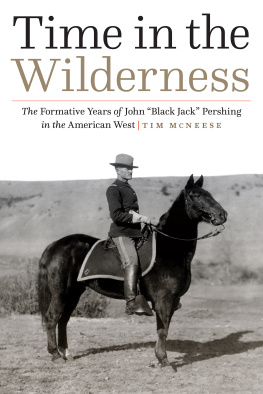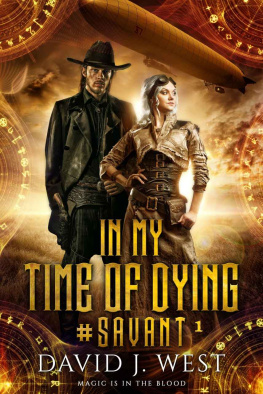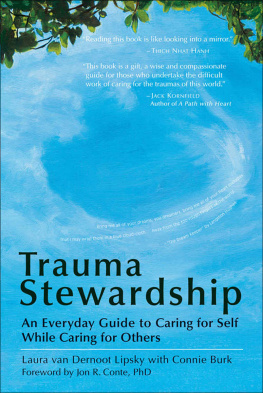David Lipsky - Absolutely American: Four Years at West Point
Here you can read online David Lipsky - Absolutely American: Four Years at West Point full text of the book (entire story) in english for free. Download pdf and epub, get meaning, cover and reviews about this ebook. year: 2014, publisher: Houghton Mifflin Harcourt, genre: Detective and thriller. Description of the work, (preface) as well as reviews are available. Best literature library LitArk.com created for fans of good reading and offers a wide selection of genres:
Romance novel
Science fiction
Adventure
Detective
Science
History
Home and family
Prose
Art
Politics
Computer
Non-fiction
Religion
Business
Children
Humor
Choose a favorite category and find really read worthwhile books. Enjoy immersion in the world of imagination, feel the emotions of the characters or learn something new for yourself, make an fascinating discovery.
- Book:Absolutely American: Four Years at West Point
- Author:
- Publisher:Houghton Mifflin Harcourt
- Genre:
- Year:2014
- Rating:4 / 5
- Favourites:Add to favourites
- Your mark:
- 80
- 1
- 2
- 3
- 4
- 5
Absolutely American: Four Years at West Point: summary, description and annotation
We offer to read an annotation, description, summary or preface (depends on what the author of the book "Absolutely American: Four Years at West Point" wrote himself). If you haven't found the necessary information about the book — write in the comments, we will try to find it.
David Lipsky: author's other books
Who wrote Absolutely American: Four Years at West Point? Find out the surname, the name of the author of the book and a list of all author's works by series.
Absolutely American: Four Years at West Point — read online for free the complete book (whole text) full work
Below is the text of the book, divided by pages. System saving the place of the last page read, allows you to conveniently read the book "Absolutely American: Four Years at West Point" online for free, without having to search again every time where you left off. Put a bookmark, and you can go to the page where you finished reading at any time.
Font size:
Interval:
Bookmark:

Copyright 2003 by David Lipsky
All rights reserved
For information about permission to reproduce selections from this book, write to or to Permissions, Houghton Mifflin Harcourt Publishing Company, 3 Park Avenue, 19th Floor, New York, New York 10016.
www.hmhco.com
The Library of Congress has cataloged the print edition as follows:
Lipsky, David, date.
Absolutely American : four years at West Point / David Lipsky.
p. cm.
ISBN 0-618-09542-x
1. United States Military AcademyHistory. I. Title.
U L L 57 2003
355'.0071'173dc21 2002191339
e ISBN 978-0-547-52375-0
v3.1016
PHOTO INSERT CREDITS : Cicerelle, DeMoss, Washington Mess, Goodfellas, Rash on bed, Bergman and Powell, Ferlazzo, and lunch formation: courtesy Mark Seliger/Corbis Outline. Adamczyk: courtesy of Joseph Adamczyk. Keirsey: courtesy of Hank Keirsey. Vermeesch promotion, Vermeesch at Beast: courtesy of John Vermeesch. Herzog in Kosovo: courtesy of Don Herzog. All other photographs by David Lipsky.
FOR THE FIGHTING GUPPIES,AND FOR EAMON DOLAN
O F ALL THE INSTITUTIONS IN THIS COUNTRY, NONE is more absolutely American; none, in the proper sense of the word, more absolutely democratic than this. Here we care nothing for the boys birthplace, nor his creed, nor his social standing; here we care nothing save for his worth as he is able to show it.
Here you represent, with almost mathematical exactness, all the country geographically. You are drawn from every walk of life by a method of choice made to insure, and which in the great majority of cases does insure, that heed shall be paid to nothing save the boys aptitude for the profession into which he seeks entrance. Here you come together as representatives of America in a higher and more peculiar sense than can possibly be true of any other institution in the land.
P RESIDENT T HEODORE R OOSEVELT ,
at the West Point centennial, 1902
PREFACE
I CAME TO LOVE , really love, road marching. Its called a suck or a haze at West Point, but I think the cadets arent being fair to it. Theres something wonderful about being in a column of marching people: the gravel popping under soles, the leather flexing in boots, the kind of saddle-top sounds as the ruck (what a backpack gets called in the Army) frames settle. Occasionally someone, out of sheer misery, sighing Oooh , or just blowing out air, which in the general silence is like a whale breaching and then slipping back under the surface. You can watch a leaf float down from a tree or stare at the guys rifle in front of you. The boiling down of life to its basic questions: Can you do this? What kind of person are you, and what can you make yourself finish? Can you hang with the rest of us? Those questions dont get asked much, in the civilian world.
One night I got stuck with a West Point company that was spending the entire evening on patrol in the woods. They had brought ponchos in their rucks and I hadnt. It was about two in the morning when the rain started. A nice earth-smelling drizzle at first. Then it became a pretty hard, thundery storm. Id never noticed that rain makes different noises on different articles of clothing: a kind of spreading, sinking hiss into a shirt, a loud spattery ploink! on jeans. One of the cadets offered me his poncho, but of course you couldnt accept it. In the dark, I found my way to two trees that had grown so close together that their upper branches formed a canopy. I obviously wasnt going to sleep, so I marched back and forth all night under this umbrella, rain dripping into my ears and down over my lips. Then, in the morning, at five, everyone shook themselves off and we marched again.
I never liked the military at all as a kid. My father told us it was the one profession we couldnt pursue: if my brother or I joined up, he promised to hire strong guys to come break our legs. In his eyes, compared to the military, hired leg-breaking was an act of kindness. So when Rolling Stone magazine first assigned me to write about the United States Military Academy, I fought it. And I mean fought hard, as hard as you can fight Rolling Stone s publisher, Jann Wenner, who can be firm and cajoling in a kind of (at least to a writer) irresistible way. When I gave in, and traveled to West Point, I was followed by members of the Academys Public Affairs Office. They chose the people I could speak with, they sat in on the interviews. I saw my way out; I was thrilled and relieved. I said I could not do the story under those circumstances, and I left. A few days later the colonel who oversees the daily management of West PointJoe Adamczyk, a thin, steely man the cadets nicknamed Skeletorcalled back to say it was fine. There would be no one picking out ideal cadets for me to interview, no one escorting me, no doors closed. I could have the run of the place. We have nothing of which we should be ashamed, he said.
So that was the first step toward my love of road marching. Very different from my original idea of the Army. And there was no avoiding the story anymore.
It had all seemed so foreign, a kind of dense green forest. Slowly, the trees parted a little, enough for me to step inside, and then I could feel the basic goodness of the place. As I listened to the cadets and understood how they were living, I had a strange, funny thought. Not only was the Army not the awful thing my father had imagined, it was the sort of America he always pictured when he explained (this would happen every four years, during an election cycle) his best hopes for the country. A place where everyone tried their hardest. A place where everybodyor at least most peoplelooked out for each other. A place where peopleintelligent, talented peoplesaid honestly that money wasnt what drove them. A place where people spoke openly about their feelings and about trying to make themselves better.
One reason Rolling Stone wanted me on the story was that Id become a kind of young-person specialist. You specialize at a magazine. On news stories, I mainly covered universities and students. I must have traveled to about thirty-five colleges in the five years before I first went to West Point. From tiny places like Wisconsins obscure, homemade-feeling Beloit to a thirty-thousand-student factory like the University of Georgia at Athens to places like Harvard and Yale that made me feel like maybe I wasnt changing my socks often enough. Id also written about young TV actors and the young rich and young media executives, people who had every reason to be consistently delighted. And of all the young people Id met, the West Point cadetsalthough they are grand, epic complainerswere the happiest. That was probably step two on the path toward my love of road marching.
Heres three: My friends had reached the phase, in their early thirties, when things slow down and you can relax and look around yourself again for maybe the first time since college. Before that, life is like sticking your head out the window of a fast-moving car: everything is rushing at you, flattening back your skin, your eyes are blinking and you can barely overhear your own thoughts. Most of those thoughts are Will I find a job? and Can I find a partner? and What kind of life am I going to have? By the early thirties, this stuff had quieted down, and my friends were thinking, OK, Ive found a life. And then the second part hit: Is this the life I want? Does the job Im doing matter to anyone else? It was right at this time that the Army and the Academy dawned on me, and I saw what it meant to live as a group, to share experiences, and to have that sense that other people were honestly looking out for you. And I have to say, that looked pretty good to me too.
And so, a road march. Everyone dressed the same. Everyone with a clear assignment: You will depart from this first point and you will arrive at this second point, and it will be clear to you when you have accomplished this. It will be difficult (in the Army, they say challenging). In place of the anxiety that comes from jobs that involve only the brain, the pleasure of a task that would engage the entire body. When cadets faltered, other cadets would softly encourage them. Come on. You can do this. I know you can do this. The sound of the boots and the smell of the road and the sun on the leaves and this soft, encouraging undertone. When cadets fell, other cadets would move forward, lift them up. I remember, during my first road marches, feeling simply blessed.
Next pageFont size:
Interval:
Bookmark:
Similar books «Absolutely American: Four Years at West Point»
Look at similar books to Absolutely American: Four Years at West Point. We have selected literature similar in name and meaning in the hope of providing readers with more options to find new, interesting, not yet read works.
Discussion, reviews of the book Absolutely American: Four Years at West Point and just readers' own opinions. Leave your comments, write what you think about the work, its meaning or the main characters. Specify what exactly you liked and what you didn't like, and why you think so.

